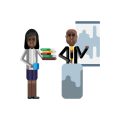Understanding Career Assessments: An Overview
Career assessments are valuable tools that help you learn more about yourself and make smarter career choices. Whether youre new to the job market, looking for a change, or aiming to grow in your current role, these assessments can give you insights into your strengths, interests, and work preferences. In the U.S., career assessments are often used by job seekers, students, and professionals who want to understand where they fit best in the workforce.
What Are Career Assessments?
Career assessments are structured questionnaires or tests designed to evaluate different aspects of your personality, skills, values, and interests. The main purpose is to provide guidance on potential career paths that align with who you are as a person. These tools dont tell you exactly what job to take but offer suggestions and ideas based on your unique profile.
Why Use Career Assessments?
- Self-awareness: Discover what motivates you and what kind of work environment suits you best.
- Informed decisions: Make better choices about education, training, or job options based on your assessment results.
- Confidence: Feel more confident about your career direction because its based on personal insights.
Common Types of Career Assessments Used in the U.S.
There are several popular types of career assessments available for American job seekers. Here’s a quick overview:
| Type | Main Focus | Popular Examples |
|---|---|---|
| Personality Assessments | Measures traits and preferences | Myers-Briggs Type Indicator (MBTI), Big Five Personality Test |
| Interest Inventories | Identifies work activities you enjoy | Strong Interest Inventory, Holland Code (RIASEC) |
| Aptitude Tests | Assesses natural talents and abilities | Cognitive Ability Tests, SkillScan |
| Values Assessments | Explores what matters most to you at work | Work Values Inventory, Motivational Appraisal of Personal Potential (MAPP) |
How Job Seekers Typically Use These Assessments
Many Americans use career assessments as part of their job search process. They might take them online through career websites or work with a career counselor at a college or community center. The results can help guide conversations during networking or interviews and inform decisions about which industries or companies to target.
2. Popular Career Assessment Tools in the U.S.
Choosing a career path can be overwhelming, but career assessments make it easier by helping you understand your strengths, interests, and values. In the United States, several assessment tools are widely used by job seekers and employers alike to guide career decisions and professional development. Here’s a look at some of the most recognized tools and how they’re applied in the American workplace.
Widely Used Career Assessment Tools
| Tool | What It Measures | How It’s Used |
|---|---|---|
| Myers-Briggs Type Indicator (MBTI) | Personality preferences (e.g., introversion vs. extroversion) | Used by individuals and companies to match personality types with suitable roles and team dynamics |
| Strong Interest Inventory | Interests compared to people working in different careers | Helps job seekers discover fields and jobs that align with their personal interests |
| CliftonStrengths (formerly StrengthsFinder) | Top strengths or talents out of 34 possible themes | Encourages employees to leverage their strengths for higher engagement and productivity at work |
| O*NET Interest Profiler | Work-related interests based on real-world data from U.S. occupations | A free resource often recommended by American career counselors to explore career options |
| SIGI3 (System of Interactive Guidance and Information) | Values, interests, skills, and personality traits | Commonly used by college career centers to help students plan their careers step-by-step |
How These Tools Fit into the American Workplace Culture
In the U.S., self-awareness is highly valued when it comes to career planning. Employers often encourage employees to use these assessments during hiring, onboarding, or professional development processes. For example:
- Team Building: MBTI results can help managers build balanced teams where different personalities complement each other.
- Career Change: The Strong Interest Inventory is popular among professionals considering a switch to a more fulfilling field.
- Personal Development: CliftonStrengths is widely used in leadership programs to identify and grow natural talents.
- Educational Planning: College students frequently use O*NET Interest Profiler or SIGI3 to map out possible majors or first jobs.
Tips for U.S. Job Seekers Using Career Assessments
- Be honest with your answers: The more truthful you are, the more accurate your results will be.
- Treat assessments as guides, not rules: Use them as starting points for exploration rather than final answers.
- Discuss your results: Share findings with mentors or career coaches for deeper insights tailored to your goals.
- Combine tools: Try two or more assessments to get a fuller picture of your unique profile.

3. How to Effectively Interpret Your Assessment Results
Understanding What Your Results Really Mean
Taking a career assessment is just the first step—knowing how to read and use your results is where the real value comes in. Many U.S. job seekers get their assessment reports and feel unsure about what to do next. Here’s how you can break down your results and start making confident career choices.
Look for Patterns, Not Just Scores
Your assessment might give you numbers or highlight certain careers, but it’s important to look for patterns across the different sections. Are you consistently showing interest in creative work? Do your strengths point toward problem-solving or helping others? Identifying these trends helps you focus on fields and roles that match who you are.
Match Your Strengths, Interests, and Values
Career happiness often comes from finding jobs that fit three key areas: what you’re good at (strengths), what excites you (interests), and what matters to you (values). Use this table to help organize your results:
| Assessment Area | Sample Result | What This Means for You |
|---|---|---|
| Strengths | Analytical Thinking | Look for roles needing research or problem-solving, like data analyst or project manager. |
| Interests | Helping Others | Consider careers in healthcare, counseling, or education. |
| Values | Work-Life Balance | Explore companies known for flexible schedules or remote options. |
Translate Insights Into Actionable Steps
Once you see where your strengths, interests, and values line up, brainstorm ways to use that information. For example:
- If your assessment highlights creativity and independence, research jobs like graphic design or freelance writing.
- If teamwork and structure score high, look into corporate roles with clear advancement paths.
- If job security is a top value for you, target industries like healthcare or government work.
Avoid Common Pitfalls When Interpreting Results
- Don’t take the results as absolute truth. Assessments are tools—not final answers. Use them as a starting point for exploration.
- Avoid only focusing on “top” career matches. Sometimes a less obvious option could be the perfect fit if it aligns with your unique combination of strengths and values.
- Talk through your results with others. A mentor, coach, or even a trusted friend can help you see possibilities you might miss on your own.
Your Next Move: Start Small and Experiment
You don’t have to make a huge leap right away. Try informational interviews, job shadowing, or short online courses in areas suggested by your assessment. The more you experiment based on these insights, the clearer your best-fit career path will become.
4. Integrating Assessment Results into Your Career Planning
Understanding Your Assessment Outcomes
Once you’ve completed a career assessment, the next step is making sense of your results. These assessments can reveal your strengths, interests, values, and preferred work environments. In the U.S. job market, understanding these insights helps you focus on roles and industries that truly fit who you are.
Setting Realistic Career Goals
Use your assessment results as a starting point to set specific and achievable career goals. For example, if your results highlight strong analytical skills and an interest in technology, you might target roles in data analysis or IT. Here’s a simple way to connect your results to potential goals:
| Assessment Insight | Potential U.S. Career Path | Action Step |
|---|---|---|
| Enjoys helping others | Healthcare, Social Work, Education | Research entry-level positions in these fields |
| Strong problem-solving skills | Engineering, Consulting, IT Support | Seek internships or training programs |
| Values creativity | Marketing, Design, Media | Create a portfolio or take online courses |
Applying Insights to Your Job Search
Your assessment can guide where and how you look for jobs. If your results suggest you thrive in collaborative environments, focus on companies known for teamwork and positive culture. Use platforms like LinkedIn or Glassdoor to research employer reviews and workplace values—these tools are especially popular with American job seekers.
Tips for Using Assessment Results During Job Applications:
- Customize your resume: Highlight skills and experiences that match your assessment strengths.
- Prepare for interviews: Be ready to discuss how your traits align with the company’s needs.
- Select companies mindfully: Apply to organizations where your values are a good fit.
Guiding Your Professional Development
Your career assessment isn’t just for finding your first job—it can also shape ongoing growth. Identify skill gaps or areas for improvement suggested by your results. Then look for professional development opportunities such as workshops, certifications, or mentorship programs that are widely available in the U.S.
Example: Using Assessment Results for Growth
- If you lack experience in public speaking but your dream role requires it, consider joining local Toastmasters clubs or enrolling in online communication courses.
- If your assessment shows strong leadership potential, volunteer for team projects or community organizations to build real-world experience.
By actively integrating your career assessment outcomes into each stage of planning—goal setting, job searching, and professional development—you’ll make informed decisions that fit both your personal strengths and the unique demands of the American job market.
5. Common Pitfalls and Best Practices
Common Mistakes U.S. Job Seekers Make with Career Assessments
Career assessments can be powerful tools, but many job seekers in the U.S. fall into some typical traps that limit their effectiveness. Being aware of these pitfalls can help you get the most value from your assessment results.
| Common Pitfall | What It Looks Like | How to Avoid |
|---|---|---|
| Relying Only on the Assessment | Basing all career decisions on test results without considering real-life experiences or personal preferences. | Use assessments as one piece of the puzzle; combine results with informational interviews, internships, and self-reflection. |
| Misunderstanding Results | Assuming assessment outcomes are absolute or predictive, rather than indicative of tendencies or strengths. | Review results with a career counselor or coach who understands U.S. workplace culture and can provide context. |
| Ignoring Cultural Fit | Pursuing roles that match assessment results but don’t fit your values, lifestyle, or work environment preferences. | Research company cultures and consider how your values align with potential employers in the American workplace. |
| Not Updating Assessments | Treating an old assessment as still relevant after gaining new skills or life experiences. | Retake assessments periodically, especially after career changes, new education, or significant life events. |
Best Practices for Making the Most of Career Assessments
To maximize the benefits of career assessments during your U.S. job search, try following these expert-backed recommendations:
- Combine Multiple Tools: Use different types of assessments (like personality, skills, and interests) for a more complete picture.
- Seek Professional Guidance: Discuss your results with a career counselor familiar with American hiring practices for tailored advice.
- Reflect on Your Goals: Think about how your assessment results align with your personal ambitions and current job market trends in the U.S.
- Create an Action Plan: Turn insights into concrete steps—research careers, update your resume, network with professionals, or pursue new certifications if needed.
- Stay Open-Minded: Remember that assessments highlight possibilities—not limitations. Stay flexible and curious as you explore new opportunities.
Your Next Steps
If you’re ready to make informed career decisions, use these best practices to interpret your assessment results wisely and avoid common mistakes. With the right approach, career assessments can be a valuable resource for navigating the competitive U.S. job market.


